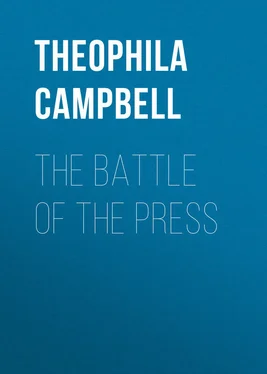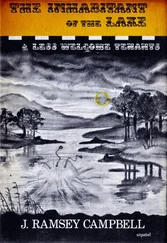Theophila Campbell - The Battle of The Press
Здесь есть возможность читать онлайн «Theophila Campbell - The Battle of The Press» — ознакомительный отрывок электронной книги совершенно бесплатно, а после прочтения отрывка купить полную версию. В некоторых случаях можно слушать аудио, скачать через торрент в формате fb2 и присутствует краткое содержание. ISBN: , Жанр: foreign_antique, foreign_prose, Историческая проза, на английском языке. Описание произведения, (предисловие) а так же отзывы посетителей доступны на портале библиотеки ЛибКат.
- Название:The Battle of The Press
- Автор:
- Жанр:
- Год:неизвестен
- ISBN:http://www.gutenberg.org/ebooks/38370
- Рейтинг книги:4 / 5. Голосов: 1
-
Избранное:Добавить в избранное
- Отзывы:
-
Ваша оценка:
- 80
- 1
- 2
- 3
- 4
- 5
The Battle of The Press: краткое содержание, описание и аннотация
Предлагаем к чтению аннотацию, описание, краткое содержание или предисловие (зависит от того, что написал сам автор книги «The Battle of The Press»). Если вы не нашли необходимую информацию о книге — напишите в комментариях, мы постараемся отыскать её.
The Battle of The Press — читать онлайн ознакомительный отрывок
Ниже представлен текст книги, разбитый по страницам. Система сохранения места последней прочитанной страницы, позволяет с удобством читать онлайн бесплатно книгу «The Battle of The Press», без необходимости каждый раз заново искать на чём Вы остановились. Поставьте закладку, и сможете в любой момент перейти на страницу, на которой закончили чтение.
Интервал:
Закладка:
After giving the first, second, and third clauses of the Bill, he comes to the fourth clause, which empowers the judges or magistrates who shall preside at the second conviction of the individuals for either blasphemous or seditious libel to use their discretion (!) in fining and imprisoning such individuals or of banishing them from the country.
The fifth clause enacts that a person so sentenced to banishment shall leave the country within thirty days, or in default thereof he will be seized and sent to such a place as the Government may propose.
The sixth clause makes liable to transportation to Botany Bay, the Hulks, or to similar penalty the individual who should be found in any part of the British dominions within the term of his banishment. The letter continues: —
"The last and most important Act is now to be considered, which is entitled, 'An act to subject certain publications to the duties of stamps upon newspapers, and to make other regulations for restraining the abuses arising from the publication of blasphemous and seditious libels', but is, in fact, an imposition of a duty on political knowledge and information, for the better preservation of ignorance amongst the laboring classes. There are some very unfair exceptions in this Act; for instance, every pamphlet written in defence of the Christian religion is exempt from the duty imposed by this Act, whilst every answer coming within the quantity of paper and price prescribed, is subject to it. For instance, Dr. Rudge 8 8 Dr. Rudge was a clergyman of the Established Church who sent Carlile Soame Jenyns' "View of the Internal Evidence of the Christian Religion" shortly before his sentence. A long correspondence was kept up between Carlile and the Doctor, which was published in the Republican .
might address me on the evidences of the Christian religion in the Christian Champion for fourpence (8 cents), but I could not answer him in the Republican for less than sixpence (12 cents). These, Sir Robert, are your deeds, and they are worthy of you, for apostasy is always desperate and vicious in proportion to its former profession, while consistency at the same time becomes its mirror and object of attack.
What view your former patron had in pushing you forward is not for me to say, whether he was anxious to find an Attorney-General who should outstrip him in infamy whilst filling that office is best known to himself; but certainly, if that was his object, he has succeeded well. Your profession is certainly one that gives native genius an opportunity of displaying itself, and with a corresponding degree of spirit to reach the highest and most important offices of the State. Perhaps there never was an instance before of so young a man as yourself, or one who has been so short a time at the Bar, reaching the office you now fill, and on hearing your name announced for the office of Attorney-General I, with many others, was astonished at the promotion, knowing you by name only, as the man who was horsewhipped by Mr. Gurney, of Stannery Court notoriety, and your bringing a suit against him. In London you certainly were a briefless barrister. It was supposed that some one had discovered some lurking talent in you, and had been generous enough to push you forward. But how great was the surprise to find that you were destitute of talent as a lawyer, of grace as an orator, and of dignity as an officer of State. There are those who have affirmed that noble minds can proceed only from noble birth; as far as you are the object in view, this maxim is certainly verified, but it must be admitted that history affords us many exceptions to this rule. You, Sir Robert, in the absence of talent and of every requisite for your office and profession, have been fortunate enough to make up the deficiency by the assistance of a powerful friend. If Sir Vicary Gibbs had possessed no other personal means of bringing him out of Devonshire, and the western circuit, than Sir Robert Gilford possesses, both would have remained there to this day, the one a worn-out barrister, the other an attorney's clerk. But fortunately for you, your father had the means as a tradesman of assisting Sir Vicary Gibbs when in a state of penury, and a part of the contract was that you should be pinned on to his tail.
"R. Carlile.
"Dorchester Gaol,
"Jan. 10th 1820."
In a later letter to Sir Robert Gifford, Carlile says in a postcript: —
"I begin to fear that you and I shall never meet again in Guildhall. I mean to occupy the whole time of my imprisonment in preparing myself for the next defence of the 'Age of Reason'. If ever we meet again (in Court), I shall certainly detain you a month. I had calculated on at least ten days before, instead of three. But I had not studied my subject in the slightest degree; I kept everything to my natural feelings and a few hours' arrangement of books. I suffered myself, and foolishly, to be brow-beaten by Abbott. But the next time I will either make my defence or drive him out of Court, or he shall remove me from Court to finish the case."
Carlile dedicated the second volume of the Republican to Sir Robert in the sarcastic style which he always used in addressing him. I will give the dedication complete, as it is short, and so dismiss Sir Robert from our pages: —
"Dedication to Sir Robert Gifford, Knight, His Majesty's Attorney-General.
"Gratitude being one of the noblest traits in the character of animals, both rational and irrational, to whichever you may deem me allied, I feel that I owe it to you. I therefore embrace the earliest opportunity of dedicating a volume to you, in which I have had frequent occasion, most respectfully, to make allusions to your name and office. If I had followed the old and beaten track of troubling you with an adulatory application, begging your permission to accept this dedication, I am certain that it would have excited your ire to such a degree as to have occasioned a foaming at the mouth; equal to that which I lately witnessed in the Court of King's Bench. Therefore, considering that the soil of Devon has nurtured us both; that we sprang up at nearly the same time and under very similar circumstances, and that our relative situations in London has united us in an indissoluble tie, assuming a frank and friendly conduct, I have presumed to inscribe this second volume of the Republican to you as a token of my esteem and my sense of the high honor and benefit you have graciously bestowed on me. Should the Attorney-General be angry and think me over presumptuous, I am satisfied that Sir Robert Gifford will be pleased to have a volume dedicated to him which is replete with matter akin to his own feelings. You, Sir Robert, are amongst those who have taught us that a man, in office and out of office, forms two distinct beings, opposite both in nature and in principle; and I should not be surprised if, in the course of the revolutions of all that is natural, this country should adopt a representative system of government, or, in other words, a republican form, to find you filling some office to which your abilities shall be commensurate on the ground of your former boasted principles. It is a fact, daily demonstrated, that men who are eager to fill official situations never make principle a bar to obtaining them. It is but fair to say that when such men have a principle or attachment to a particular form of government, they are calculated to fill such a situation or office under that system with more satisfaction both to themselves and the public, but they are ever ready to sacrifice principle to interest. Since, Sir Robert, you cannot lay claim to eminence in this or any other degree, I am sufficiently charitable to lay aside the weapon of censure, and grateful to confine myself more to acknowledgment of the utility of your tergiversation towards him who prays that you may fill the office of Attorney-General as long as his Majesty or his heirs and successors shall grace the throne of Great Britain."
Читать дальшеИнтервал:
Закладка:
Похожие книги на «The Battle of The Press»
Представляем Вашему вниманию похожие книги на «The Battle of The Press» списком для выбора. Мы отобрали схожую по названию и смыслу литературу в надежде предоставить читателям больше вариантов отыскать новые, интересные, ещё непрочитанные произведения.
Обсуждение, отзывы о книге «The Battle of The Press» и просто собственные мнения читателей. Оставьте ваши комментарии, напишите, что Вы думаете о произведении, его смысле или главных героях. Укажите что конкретно понравилось, а что нет, и почему Вы так считаете.












